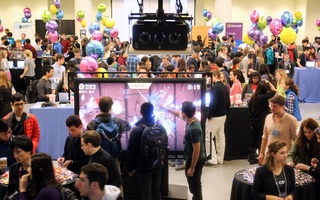{shortcode-e4a3003cfdd7ec441a58925dfd2930885af3342f}
The email from Computer Science 50: “Introduction to Computer Science I” head instructor David J. Malan ’99 arrived when one CS50 enrollee was sitting in the airport on Jan. 9, waiting to board a flight home for winter break.
Exams had wrapped up almost two weeks earlier on Dec. 20, and she had received her grade in every other class—but the student was still unable to see her final score in CS50. The student emailed course staff on Jan. 6 asking them why her online transcript read “PND,” short for “pending.”
Three days later, Malan responded.
“I’m afraid the PND is the result of some concerns on our part regarding academic honesty that have been referred to the Honor Council,” reads Malan’s email, obtained by The Crimson. “They should be in touch soon, but allow me to loop in your resident dean, cc’d, in the meantime for counsel.”
The student—granted anonymity by The Crimson because she did not want her name associated with cheating accusations—was one of over 60 CS50 enrollees who appeared before the Honor Council to face allegations of academic dishonesty in a wave of cheating first reported by The Crimson last week.
It would be almost six weeks before the student received the Honor Council’s final judgment—a “scratch,” meaning she was cleared of all charges—on Feb. 13.
The Honor Council sends a document to students accused of academic dishonesty promising to “conclude [its] review quickly.” But three students who took CS50 and faced the Honor Council this semester described a disciplinary process that lasted weeks and sometimes months.
These students and former Honor Council member Matthew J. Vegari ’17 said Malan’s method of checking for cheating caused the CS50 Honor Council cases to take longer than usual. Malan did not respond to a request for comment Tuesday.
Malan does not check for cheating until near the end of the fall semester, when he runs an algorithm that flags potential plagiarism, according to five current and former CS50 staffers. He then reviews and sends possible academic dishonesty cases to the Honor Council, the roughly 30-person administrative body that adjudicates such cases at the College.
The sudden rush of CS50 cases placed a heavy burden on the Honor Council over the past few months, according to two individuals with direct knowledge of the investigations. The Honor Council continued to hear CS50 cases until at least late February, according to two CS50 students who appeared before the Council.
Vegari, who served on the Honor Council from 2015 to 2016, said the amount of time required to resolve some CS50 students’ cases was “unusual.”
Vegari said last semester’s CS50 cheating cases likely took longer because Malan reported the cheating to the Honor Council at the end of the semester. He added that, during his tenure on the Honor Council, no other Harvard professor checked and reported academic dishonesty cases as one batch late in the year, as Malan does.
“I found it very unfair to the students and it was unfair to the Honor Council and the administrative staff,” Vegari said of Malan’s approach.
Two CS50 students who appeared before the Honor Council said the late timing of their cases exacerbated an already stressful situation.
“Malan choosing to wait until the end of the class… just puts everybody in a bad situation, nobody wants to be in that situation,” one student said.
Mark D. Grozen-Smith ’15, a former CS50 teaching fellow, said he also finds Malan’s procedure of checking for cheating worrisome, though he said he thought the situation poses a “hard problem.”
“It does concern me, the point of checking only at the end,” Grozen-Smith said.
Four other course staffers, who asked to remain anonymous because they are not authorized to speak to the press about the class, said they were similarly troubled by Malan’s approach to finding cases of academic dishonesty.
Vegari said he found Malan’s methods especially frustrating because he thinks the problem has an easy fix.
“I don’t know if he’s made plans to correct it, but clearly there is a way of correcting it, which is, just run the algorithm earlier,” Vegari said. “It’s not like they don’t get the students’ code until the end of term, they get it week by week and then they just kind of compile it and then they run it all at the end of term.”
“The point is, there is an obvious solution, it’s not like there’s no way to fix this,” Vegari added.
—Staff writer Hannah Natanson can be reached at hannah.natanson@thecrimson.com. Follow her on Twitter @hannah_natanson.Read more in News
Innovation Challenge Awards Funds to Social Enterprise Start-UpsRecommended Articles
-
 This Is CS50.
This Is CS50. -
 Five Questions About The Honor Code, Answered
Five Questions About The Honor Code, Answered -
 Malan, Harvard Filed Separate CS50 Trademark Applications
Malan, Harvard Filed Separate CS50 Trademark Applications -
On Issues of Academic IntegrityWe hope that, by acknowledging risk factors, our campus will find clear-cut measures to combat them and promote academic integrity.
-
 Some Accused of Cheating in CS50 Sought Legal Counsel
Some Accused of Cheating in CS50 Sought Legal Counsel













